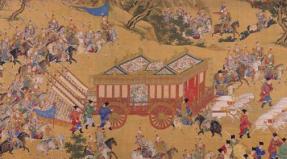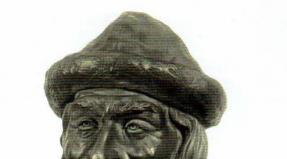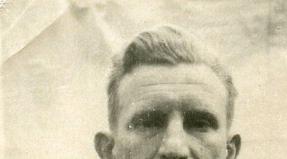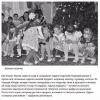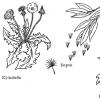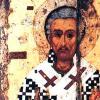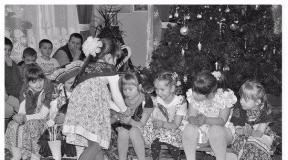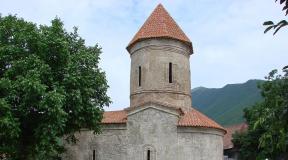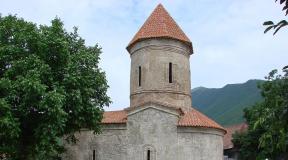Philosophical-ethical and socio-political views
Ministry of Education of the Republic of Belarus
EE "Polotsk State University"
Department of Social -
humanitarian disciplines
ESSAY
in the discipline "History of Belarus"
on the theme "Francis Skaryna"
Completed: student gr. 10-Pel
Kozhernovich Egor
Novopolotsk 2010
INTRODUCTION…………………………………………………………………………….3
1. FRANCIS “FROM THE GLORIOUS PLACE OF POLOTSK”…………………………4
2.BELARUSIAN BIBLE………………………………………………………….5
3. DOCTOR, SECRETARY, GARDENER…………………………………………………7
4. DIVINE AND EARTHLY…………………………………………………..9
5. INTERESTING FACTS………………………………………………………...12
CONCLUSION……………………………………………………………………..13
LIST OF USED SOURCES…………………………………14
Introduction
Francysk Skaryna, who lived and worked in the field of Christian enlightenment in the era of the European humanistic Renaissance (the first half of the 16th century), is deeply revered in Belarus. The main avenue of the Belarusian capital, many streets, schools, higher and secondary educational institutions of the country, the Order of Francysk Skaryna, the highest state award, are named after him. However, much of the life of the great humanist is still shrouded in mystery. For several centuries, researchers have been studying the riddle of personality, trying to reproduce the stages of life and work of the publisher and commentator of the first printed Bible in the Old Belarusian language, addressed not only to Belarusians, but to all East Slavic peoples. Skaryna's Bible came out before the German Martin Luther and almost half a century ahead of the Polish and Russian publishers. But even today the biography of the great enlightener is indicated only in dotted lines. The exact dates of his birth and death, the place of burial are unknown, information about religion is very contradictory. But the search was conducted by dozens of inquisitive minds, since the importance of Skaryna for the development of European writing can hardly be overestimated.
1. FRANCIS "FROM THE GLORIOUS PLACE OF POLOTSK"
The Belarusian educator and printing pioneer Francysk Skaryna was born, in his own words, in “the glorious place of Polotsk”, into a merchant family. Regarding the date of birth, most researchers tend to 1490, it was he who was determined during the celebration of the 500th anniversary of the birth of the first printer. 1990 was declared the year of Skaryna by UNESCO. The justification for this version is the reliable fact that in 1504 Skorina entered the University of the Polish city of Krakow at the Faculty of Liberal Arts, where they were admitted upon reaching 14 years of age. The acts discovered more than a hundred years ago testified that two years later he was awarded a bachelor's degree. According to some reports, a fairly solid education at that time allowed the young man to become the secretary of the king of Dacia (a province in Romania).
The young man did not need financially: his father traded furs and skins throughout Europe, and after his death, the business passed to his eldest son Ivan.
A few years later, Francis ended up in Italy, where in 1512, after passing the exams at the University of Padua, he received the title of doctor of medicine. Records of the exam protocol have been preserved, which, in particular, say: “He showed himself so commendably and excellently during a rigorous test, presenting answers to questions put to him and rejecting the evidence put forward against him, that he received the unanimous approval of all the scientists present without exception and was recognized with sufficient knowledge in the field of medicine. Later, he will refer to himself as: "in the sciences and medicine, a teacher", "in the medicinal sciences, Doctor", "scientist" or "chosen husband".
"His name is engraved on a marble plaque along with the names of the most famous graduates of the University of Padua, where in 1512 he brilliantly defended the title of doctor of medicine. He is the founder of the Prague Botanical Garden, the oldest in Europe. However, not only successes in medicinal sciences and botany glorified the name of Francis Skaryna, put him on a par with the greatest people of the High Renaissance, those whom Engels called titans in terms of strength of thought, passion of character, versatility and scholarship.In 1517, Skaryna's first book was published in Prague - the first printed book in the Old Belarusian language, the first Russian printed book.
The "Hall of Forty" of the University of Padua contains images of forty of its greatest graduates, among them Frantisek Skaryna.
In the preface to it we read:
"The ZUPOLN IS LAUNCHED IN RUSSIAN LANGUAGE BY DOCTOR FRANCISKY SKORINA, FROM THE GLORIOUS CITY OF POLOTSK, TO HONOR GOD AND THE PEOPLE OF THE RUSSIAN POLICY TO INVESTMENT."
This is - "people who are commonwealth to teach" - is in the prefaces to all the books of Skaryna. “People of the Commonwealth” means not to kings, not to the clergy, not to princes and boyars, but to ordinary people for “instruction”.
And then here, in Prague, he does a truly incredible job - for only three years, Skaryna publishes almost all the main books of the Bible, Psychology ...
2.BELARUSIAN BIBLE
With the financial support of Belarusian patrons, F. Skorina founded a printing house in the capital of the Czech Republic, Prague. On August 6, 1517, he publishes a Psalter, then almost every month a new book of the Bible. In two years he published 23 illustrated books. At the dawn of typography (Gutenberg invented typesetting only in the middle of the 15th century), such a pace was impossible without prior preparation. Probably, Skaryna already had manuscripts of all the books of the Bible translated into her native language, which she did for several years after studying in Italy.
The Bible published by F. Skorina in its translation into the Old Belarusian language is a unique phenomenon. The forewords and afterwords written by him captured the feeling of the author's self-awareness, patriotism, historicism, an awareness of the uniqueness of each life event, unusual for that era.
"The language in which Francysk Skaryna printed his books was based on the Church Slavonic language, but with a large number of Belarusian words, and therefore was most understandable to the inhabitants of the Grand Duchy of Lithuania. Skaryna's Bible violated the rules that existed when rewriting church books: it contained texts from the publisher and even an engraving with his image. This is the only case in the entire history of Bible publishing in Eastern Europe. Because of the ban on self-translation of the Bible, the Catholic and Orthodox Church rejected Skaryna's books."
The design of Skaryna's books is also admirable. In the first Belarusian Bible, the publisher included almost fifty illustrations: numerous headpieces, other decorative elements in harmony with the layout of the pages, font and title pages. His Prague editions contain many ornamental decorations and graphic initials. Later, in publications produced in his homeland, he used more than a thousand of these initials. The uniqueness of the first Belarusian Bible also lies in the fact that the publisher and commentator placed in the books a self-portrait, complex in composition and symbolic meaning. According to some researchers, the guess about the heliocentric system is encrypted in symbolic engravings. If you think about it, this is not much of a surprise. Francysk Skaryna has a lot in common with Nicolaus Copernicus. At about the same time, they studied not only in Poland, but also in Italy. Both studied medicine. Perhaps they met. But the main thing is that F. Skorina and N. Copernicus are the founders of the new time, the product of one spiritual and historical environment.
The books depict beautiful engravings of such a class that Stasov said about them: “The elegance of the drawing, the mastery of the engraving, which for such a short time shone in the Venetian and Skorinin editions, has never been repeated in any edition of the Church Slavonic press of the second half of the 16th century. , only the 17th and the first half of the 18th century. But on the other hand, both those and other publications subsequently had a direct influence on the fate of Russian woodcuts. In addition, they were placed inside rectangular frames, as was customary since the Venetian incunabula. Skaryna's editions are closer to Western European ones than even Slavic books executed in Venice.
How important national motifs in book ornament were for Skaryna can be judged by its very first edition - the Psalter. An engraved initial with a clover flower in the opening of the letter adorns its title page. In subsequent editions of the Bible, at least 38 more impressions were made from this board.
F. Skorina's books are an invaluable asset of world culture. There is no complete collection of his original editions in any library in the world. Czech editions (23 books) became publicly available only after their facsimile reproduction by the Belarusian Encyclopedia publishing house in the early 1990s. Last year, at the initiative of the German Slavist Hans Rote, a facsimile reprint with theoretical and textual comments of an even rarer edition of F. Skorina "Apostle" was carried out.
It is difficult to unequivocally answer why Prague was chosen by Skaryna to implement her plans. Some researchers believe that the Belarusian educator was associated with the Belarusian-Polish royal dynasty of the Jagiellons (and during the stay of Francysk Skaryna in Prague, Jagiellon Ludwig I was the Czech ruler). In general, the Jagiellonian dynasty played a significant role in the life of Europe. King Jagella married Princess Sophia Golshanskaya in Novogrudok (now a district town in Belarus). Jagella's heirs throughout medieval history entered into dynastic marriages with royal and royal courts. The house of the Romanovs also originates from the Jagiellons.
Perhaps the main role in choosing the place for founding the printing house was played not by the sympathy of the king, but by the previously published Czech Bible, which F. Skorina took as a model. Where exactly was the printing house of the Belarusian first printer, unfortunately, is unknown.
On the eve of the 480th anniversary of Belarusian book printing, a monument to Francysk Skaryna was unveiled in Prague and a memorial plaque was erected.
3. DOCTOR, SECRETARY, GARDENER
Around 1521, Skorina returned to his homeland and founded the first East Slavic printing house in Vilna. Already next year, he publishes the "Small travel book", which combines the Psalter, the texts of church services and hymns, and the astronomical church calendar. In March 1525, Skorina also published "Apostol" ("Acts and Epistles of the Apostles") there. With this book, 40 years later, Russian book printing was started in Moscow by Ivan Fedorov and Pyotr Mstislavets, natives of Belarus.
For almost ten years, Skaryna has been combining the positions of a secretary and a doctor in the service of the Bishop of Vilna, the illegitimate royal son. At the same time he is engaged in publishing business, helps his brother in trade.
F. Skorina travels a lot. He visits Wittenberg to the founder of German Protestantism, Martin Luther. Just at this time (1522-1542) the founder of Lutheranism was translating into German and publishing the Protestant Bible. In addition, he was a doctor of theology, and Skaryna was deeply interested in social, legal and ethical problems in the context of biblical teaching. However, there was no rapprochement between them. Moreover, Luther suspected a Catholic missionary of the Belarusian first printer and left the city.
Despite this, their fates have many similarities. Martin Luther, having published the Protestant Bible in German, actually canonized him. The same can be said about the role of Francysk Skaryna in the formation of the Belarusian language. The influence of his books on the Russian language is undeniable.
Around the same time when F. Skorina visited M. Luther, he visited Moscow with an educational mission. He probably offered his services as a publisher and translator. However, by order of the Moscow prince, he was expelled from the city. The books he brought were publicly burned as heretical because they were published in a Catholic country. There is no doubt that some of them still survived. But the influence of the Belarusian F. Skorina on the formation of the Russian language to a greater extent occurred later - through the publication of books in Muscovy by I. Fedorov and P. Mstislavets, who used the works of their compatriot in their work.
Soon, F. Skorina, at the invitation of the last master of the Teutonic Order, the Prussian Duke Albrecht, visits Koenigsberg. But at that time in Vilna, during a fire that destroyed two-thirds of the city, Skaryna's printing house burned down. I had, despite the anger of the duke, to return. The dramatic events did not end there. During the fire, his wife died. The older brother died a year earlier. His creditors, the Polish "bankers", made debt claims to Francis, and he ended up in prison. True, a few weeks later he was released by royal decree, taken under royal guardianship and legally equated to the gentry (noble) class. The monarch gave him a special privilege: “Let no one, except us and our heirs, can bring him to court and judge, no matter how significant or insignificant the reason for his summoning to court ...”.
Publishing and educational activities did not bring dividends to F. Skorina, but rather exhausted his initial capital. After the death of his patron, the Bishop of Vilna, Francis goes to Prague. He becomes a gardener for King Ferdinand I of Habsburg, who would later become Holy Roman Emperor.
One might wonder: what is the unusual transformation of a doctor and publisher into a gardener? Most likely, F. Skorina was a botanist and gardener. In those days, medical education included knowledge in the field of botany. According to some reports, Skaryna in Prague specialized in the cultivation of citrus fruits and herbs for healing.
The correspondence of the Czech king with his secretary has been preserved, from which it turns out that the “Italian gardener Francis” (as F. Skaryna was called there) served with him until July 1539. It was then that the king honored him with a farewell audience.
13 years later, Ferdinand issued a letter stating that “Doctor Frantisek Rus Skaryna from Polotsk, who once lived, our gardener, was a stranger in this Czech kingdom, descended to eternal rest and left behind his son Simeon Rus and certain property, papers , money and other things belonging to him. The king ordered all employees of the state to help the son of Skaryna in receiving the inheritance. The archives testify that Simeon also inherited his father's profession: he was a practicing doctor and a gardener.
About what "Francis from the glorious place of Polotsk" did before his death and whether he returned to the publishing business, history is silent.
4. DIVINE AND EARTHLY
F. Skorina's enlightening comments on the biblical books contain signs of Renaissance thinking, based on the assessment of the Bible as a divinely inspired work of wise and talented authors. They contain fragments of elegant writing, theology, philosophy, jurisprudence, political ideas. Readers' attention is focused on the fate of the main characters and the main idea of each section. The comments are also interesting because Belarusian versification was born in them.
In his commentaries on the books of the Bible, Francysk Skaryna laid the foundations of domestic exegesis - the interpretation of biblical and ancient texts. As a biblical scholar and Christian, he was sensitive to theological traditions; as an educator of the Renaissance, he used scientific criticism.
God prapayasa I am strong
and the chambers are not parochen my way.
Making the nose of maya yak eleni,
nauchaya rutse May in battle.
I will burn the enemies of May and I will partake of them
and you can’t stand,
fall down naked mother.
I will make them as dust before the face of the wind.
Zhyў Gaspodz and God bless.
І voznesetstsa the God of my salvation.
Ashche paastra like lightning my sword
and the court will pass the hand of May.
Vazdam a month to my enemies
and hating me vazdam
I will drop the arrows of May hell of blood
and my sword is to eat their meat.
Stary Olsa, "Psalm III and Song B," Psalter "F. Skaryna 1517"
In the XVI century. There were two methods of interpreting the Bible - historical and symbolic. Symbolic was usually used in the interpretation of biblical texts of mythological and artistic genres, and historical - in the interpretation of the New Testament books. F. Skorina used these methods in a complex way: he took into account the reality of the events of sacred history and at the same time revealed their symbolic meanings. Such interpretations include editions of the Pentateuch of Moses, prophetic books, and other biblical texts. The concept of "symbol" he designated the term "banner", "commemoration". The symbolic method allowed him to expand the biblical stories thematically.
In the prefaces to all the books of the Bible, F. Skorina notes that they were written both for internal, spiritual comprehension of the great mysteries of life, and for ordinary reading. He was convinced that science and religion, each in its own way, lead us to comprehend the truth - earthly, limited by place and time, and heavenly, eternal. God's truth goes beyond the limits of earthly existence with its laws of logic, therefore it is difficult to comprehend. After all, even philosophers led by Aristotle could not understand how God created the world out of nothing. Therefore, true wisdom is in the cooperation of science and religion, in their complementarity. The Belarusian educator wrote: “Two truths: God's and man's. Twofold judgment: God's and man's. Double praise: from God and from man.
The views of Francysk Skaryna testify to him as an educator, patriot, humanist. In the texts of the Bible, the educator Skaryna appears as a person who contributes to the expansion of writing and knowledge. This call to reading testifies to this:
“And every person needs honor, because he eats the mirror of our life, the medicine of the soul, the fun of all the vague, the most painful, they are in troubles and in weaknesses, true hope ...”.
“Because from birth, animals walking in the desert know their pits, birds flying through the air know their nests; the fish swimming in the sea and in the rivers can smell their own vira; bees and the like to harrow their hives - so are people, and where they were born and nourished, according to the Bose, to that place they have a great affection.
The basis of morality and a legal society, according to Skaryna, is an innate law written by God in a person’s heart: and do not repair to others what you yourself do not want to have from others. This categorical imperative of Christian and universal human ethics was later developed by the German philosopher I. Kant, giving it legal content: it was prescribed to always act in such a way that the maxim (rule) of your action could be the basis of universal legislation. 260 years before Kant, the Belarusian educator proved that all laws are based on the gospel moral imperative. In the preface to the biblical book Deuteronomy, F. Skaryna proposed a classification of law, highlighting civil (“commonwealth”, “zemstvo”), family, obligation, criminal, international, military (“knightly”), state (“royal”).
F. Skorina, following Aristotle and Christian philosophers, connected the main ethical category “good” with the concept of “beautiful”.
5. INTERESTING FACTS
Historians also have information about Skaryna's predecessors, for example, John Littow (possibly Ivan Litvin), his surname speaks about his origin, who was engaged in printing business in London.
Pyotr Mstislavets, who later became a printer himself and an associate of the first printer Ivan Fedorov, was a student of Francysk Skaryna.
In the "Hall of Forty" of the University of Padua, fresco portraits of forty of the greatest graduates of this alma mater are painted. Among them, the second after Galileo, is Francysk Skaryna.
For some time it was believed that Skaryna was actually named George. For the first time, they began to talk about this in the second half of the 19th century, after in 1858 copies of two letters of King Sigismund I in Latin were published. In one of them, the name of the first printer was preceded by the Latin adjective egregium meaning "excellent, famous", while in the second, the meaning of the word egregium was given as georgii. This single form served as a basis for some researchers to believe that Skaryna's real name was George. It was only in 1995 that the Belarusian historian and bibliologist G. Galenchenko found the original text of the privilege of King Sigismund, in which the well-known fragment “with George” was stated as follows: “... egregium Francisci Scorina de Poloczko artium et medicine doctoris”. The scribal error caused a controversy over the name of the first printer, which lasted for more than 100 years.
Fonts and engraved headpieces from the Vilna printing house Skaryna were used by book publishers for another hundred years.
From 1991 to 2005, the main avenue of Minsk bore the name of Francysk Skaryna. After the decree of President A. Lukashenko, the avenue was renamed Independence Avenue, and the former Staroborisovsky tract, next to which the National Library is located, was named Francysk Skaryna Street.
Minor planet No. 3283, discovered by the Soviet astronomer N. I. Chernykh, is named after F. Skorina.
Conclusion
In Belarus, Francysk Skaryna is considered one of the greatest historical figures. The highest awards of the country, a medal and an order are named in his honor. The university in Gomel, the central library, the pedagogical school, gymnasium No. 1 in Polotsk, gymnasium No. 1 in Minsk, the non-governmental public association "Belarusian Language Society" ("Belarusian Language Association") and other organizations and objects bear his name. Monuments to him stand in Polotsk, Minsk, Lida, Kaliningrad, Prague.
In 1990, by decision of UNESCO, the world solemnly celebrated the 500th anniversary of Francysk Skaryna. In honor of the anniversary, the publishing house "Belarusian Encyclopedia" named after. Petrus Brovki in 1991 published a three-volume facsimile edition of 23 books of the Russian Bible, printed by Francis Skorina in 1517-1519 in Prague in the language of secular writing, understandable to people of that time and accessible to modern readers.
What Francysk Skaryna actually did in Prague in the last years of his life is not exactly known. Most likely, he practiced as a doctor.
The exact date of his death has not been established, most scholars assume that Skaryna died around 1551, since in 1552 his son Simeon came to Prague for an inheritance.
List of sources used
1.[http://schoolnet.by/~stankovo/Belorusy/Francisk%20Scorina.htm]
http :// qu- tan. livejournal. com/26806. html]
Francis Skaryna (3)
Story >> HistoryCultural heritage of the Belarusian people. 4Order Francis Skaryna Citizens are awarded: - for significant achievements... http://kraj.vitebsk.net. 9 Contents Francis Skaryna- Belarusian and East Slavonic first printer, educator, humanist...
Excursion around Minsk, the capital of the Republic of Belarus
Abstract >> Physical culture and sportsTurovsky, Simeon Polotsky, first printer Francis Skaryna, composer Mikhail Kleofas Oginsky, ... - to the humanist of the Renaissance - Francis Skaryna(1490?-1551), which was... hours. Thus the books Francis Skaryna firmly entered the fund of the East Slavic ...
Renaissance and Reformation in the Grand Duchy of Lithuania
Test work >> PhilosophyActivities, philosophical views and ideas. Ideas Francis Skaryna and Nikolai Gusovsky At the origins of the Renaissance ... justice and patriotism. So the outlook Francis Skaryna characterized by a wide range. Philosophical views...
Skaryna was a spokesman for the spiritual needs of the progressive-minded citizens of Belarus, in whose worldview, under the influence of economic, socio-political and cultural shifts, there has been some departure from the orthodox feudal-church ideas of his time. At the same time, a number of Skorinin's ideals and values are of a universal nature. The originality of Skaryna's philosophical and ethical views manifested itself in the synthesis of medieval Christian, ancient and Renaissance humanistic ideas. They were significantly influenced by the ancient Russian folk-ethical and aesthetic, as well as literary and philosophical tradition. Biblical-Christian ethics is modernized and adapted by Skaryna in accordance with the ideological needs of the Renaissance, the current socio-political and national-cultural tasks of the Belarusian, Ukrainian and Russian peoples. In the center of his attention was the problem of man and society. Skorina considered and resolved the issues of the meaning of life, the spiritual world, the dignity of a person, the origin of moral ideas, spiritual and moral freedom, the common and individual good, civic activity, etc. . He made an attempt to revise the orthodox Christian interpretation of the problem of human existence, according to which the earthly life of a person is only a preparation for the life beyond. He affirmed the inherent value of human life, rehabilitated earthly existence, but did not deny faith in the afterlife. The ethics of Skaryna orients a person mainly to a real, socially useful earthly life, serving the "pospolitome", constant intellectual and moral improvement, "having learned wisdom," people "are good tenacious in the world." Skorina considered the problems of the meaning of life and the highest good in the prefaces to the books "Proverbs of Solomon", "Jesus Sirakhov", "Ecclesiastes", etc. In the preface to the book "Proverbs of Solomon" Skorina argued that the main purpose of a person is to improve earthly life, the object of - the problem "how to imati be right and live in this world". Skaryna was sympathetic to the real, earthly sea of people, at the same time opposing it with a moral ideal, which he uses as a humanistically modernized Christian-ethical concept of life. For Skaryna, the highest good - earthly good - is an intellectually rich, morally perfect and socially useful life on earth, first of all, serving people, and then God or serving God through serving people, the common good. Skaryna focuses on the spiritual world of a person, his values, ideals, vocation. “Let the man of God be perfect,” he postulates, “and prepared for every good work,” as the holy Apostle Paul writes. And for this sake, the holy letters are filled with the essence of our teaching, correction, spiritual and bodily, various customs.
Skaryna's ethical concept is based on the idea of the need and possibility of continuous improvement of human nature, on which the perfection of human life depends. He affirmed the ideal of a thinking, intellectually aspiring person. He interpreted intellectual and moral virtues as an acquisition, the result of an active creative, cognitive and socio-practical activity of a person. nor wealth", but "wisdom and understanding". Skaryna's ideal was a man who combined biblical and philosophical wisdom, "full of the Holy Spirit and philosophy." “Wisdom,” he writes, “supposedly power in a precious stone, and like gold in the earth, and a kernel in a nut. Whoever knows [her], this know mercy and will get a blessing from the Lord, and all good things will come to him with her Praise and honor are her countless motions - she is the mother of all good speeches and a teacher of every good skill.
Turning to the inner world of a person, caring about his intellectual moral virtues, Skaryna asserted one of the Renaissance-humanistic principles, according to which the true dignity and nobility of a person is not in origin, nobility, social status and not in religious zeal, but in such qualities as intelligence , moral character, abilities, thanks to which he brings real benefits to society. The Belarusian thinker seeks to find out the origin of human moral ideas. According to Skaryna, the concepts of morality have a dual basis: individual reason and divine revelation. Moreover, the natural moral law has priority: "before all laws or written rights, the law is born, it is given to all people from the Lord God to eat." The basic postulate of "born", ie. The natural moral law, deduced by the thinker from the mind, is formulated by the following gospel saying: "Repair to others everything that you yourself like from others, and do not repair that to others, which you yourself did not have from others." On this moral principle, Skorina believes, all "written" moral laws, including biblical ones, are based. Skaryna, therefore, seeks to find some universal, rational moral principle, acceptable to all people, regardless of social status and religious affiliation, on the basis of which social life could be regulated. .
The written source of moral norms, according to Skaryna, is mainly the Bible. From the religious and ethical teachings of Skaryna, it follows that a person through the Bible carries out a direct and intimate dialogue with God; he independently, without church mediation, can understand the moral and ethical meaning of "divine revelation" and achieve moral perfection. The initial provisions of morality in the view of Skaryna act as a command of moral duty and conscience. Skaryna substantiated the idea of a person's personal responsibility for his actions. The religious and moral position of Skaryna can be qualified as a manifestation of Renaissance individualism, which affirmed the morality of internal thoughts as opposed to the official church morality of afterlife retribution. Skaryna seeks to reveal in religion not its external, dogmatically ritual side, to comprehend its inner essence, mainly philosophical and ethical, to comprehend some of the fundamental universal moral values accumulated by Christianity.
Skaryna poses and solves one of the most important philosophical and ethical problems - the ratio of the individual and the common good. The thinker considers man as a social being, and his ethics is characterized by the assertion of the primacy of the common good over the individual. In the preface to the Book of Esther, Skaryna formulates the concept of public duty as follows: "Not only was he born into the world, but more to the service of God and the good of the Commonwealth." Skaryna also considered his own activities, first of all, as serving the common good ("good Commonwealth"), as the fulfillment of his duty to the people, "brothers of Russia" and the motherland. This idea is emphasized by him in almost every preface and afterword. From Skaryna's ethical teaching, it indirectly followed that people, first of all, should be united by the idea of the common good.
The most characteristic feature of Skaryna's ethical and humanistic worldview is patriotism. Skaryna was the founder of the national-patriotic tradition in the history of Belarusian culture and social thought. The patriotic beginning in Skaryna's worldview is the result of concretization of the idea of the "common good". It develops in line with the traditions of ancient Russian culture.
Justifying his activity with the interests of the "pospolite of the Commonwealth", the Belarusian humanist constantly concretizes its focus: "Sick for that reason, like the merciful God from that language let me into the world." Skorina expressed his patriotism, love for his homeland in the following wonderful words: and people, where they were born and nourished, according to the Bose, have a great caress to that place ". The ethics of Skaryna, thus, brought up a citizen and patriot in a person, formed in him the qualities necessary for active social and practical activities for the benefit of his people.
Skaryna does not absolutize the "common good" to the detriment of the "individual good", but tries to harmoniously solve the problem of the relationship between these two moral and ethical virtues. In order to be useful to society, to contribute to its improvement, improvement, preservation of value, a person must constantly develop his spirituality, cultivate in himself the moral qualities necessary for social life. According to Christian ethics, Skaryna considers love to be the most important moral virtue of a person. “Every Christian,” writes the thinker, “let him observe the greatest love for everyone, if he eats perfect over all other talents, without it, nothing eats hastily.” The affirmation of an active, socially useful worldly life as an ideal was an expression of the self-consciousness of the trade and craft strata of the urban population, and was one of the moments of the emerging early bourgeois ideology of the Renaissance.
Francysk Skaryna stood at the origins of the national Renaissance-humanistic socio-political thought. He tried to define some ideal political and legal forms, borrowed mainly from the history of the ancient world. Bible. The political ideal of Skaryna is enlightened, humane and strong monarchical power. Skorina also assessed social relations with the evangelical-Christian abstract-humanistic principles of philanthropy and justice. Human society is based on peace and harmony, "from it all good things come to every city and every assembly, bad weather destroys the largest kingdoms." Skaryna propagated the ideas of early Christian philanthropy, urged people to treat "helping each other with all love." He was aware of the difference between the real social reality of his era and the ideal.
As a social ideal, Skaryna asserted the early Christian principle "equal freedom for all, having a common name for all." Skaryna's social ideal testifies to the influence of radical reformist ideas on his worldview. It is characterized by social democracy. The thinker was guided by "simple people, commonwealth."
So, the outstanding merit of F. Skaryna is in posing the problem of man and society in the socio-philosophical thought of Belarus of the Renaissance and in an attempt to solve this problem in the spirit of Renaissance humanism. At the same time, it should be noted the abstract nature of Skorinin's interpretation of this problem and the insufficiently clear connection of his teaching with concrete historical reality. aesthetic outlook.
Skaryna attached great importance to aesthetic education and, in general, to the spiritual improvement of people by means of art. This is evidenced by his panegyric "Psalms" - a book that of all parts of the Bible is closer to art - poetry and music. According to the thinker, it is ambiguous in its content and functional purpose. Songs and poems of her "all sorts of infirmities, spiritual and bodily, heal, illuminate the soul and meanings, pacify anger and rage, mend peace and tranquility, drive away confusion and sadness, give feeling in prayers, lead people to sit down, strengthen the shop and mercy"; they are "quiet fuss and robots, the protector of the maddah and the joy of the old, fun and song, pious prayer for wives, every good ear of science for small children, growth in science for grown-ups, fashionable affirmation for men"; adorns the psalm and holy" and "to soften the cruel heart", it "together amuse the body with singing and teach the soul". This contains the thinker's guess about the semantic ambiguity and multifunctionality of art, in contrast to the semantic unambiguity of scientific logical judgments. Skorina is convinced of the comprehensive educational impact of poetry and music and the corresponding richness of aesthetic experience. He considered the "Psalter" as a work of art, so his assessment can be rightfully transferred to artistic creativity in general. Skaryna tries to overcome the Christian-medieval teaching about beauty as a category predominantly divine. He seeks to discover the beautiful mainly in the person himself, interpreting beauty as a harmony of moral-intellectual and civic virtues Skaryna is characterized by the aestheticization of human cognitive activity.
Skaryna's beauty is identical with kind philanthropy, justice, public good, citizenship and patriotism. On the basis of the merger of the ethical, socio-political and aesthetic, Skaryna solves the problem of the ideal. The thinker seeks to create an ideal image of a person, a citizen, a statesman, a military leader, to form an idea of the ideal law, state and social system. He uses the creative principle of the Renaissance artists, who put actual socio-political and aesthetic content into biblical images and allegories, and solved new artistic and aesthetic tasks with their help.
Beautiful in Skaryna are not only the human spirit, mind, virtues, but also to some extent the physical nature of a person, his health and, in general, the beauty of the material world. Arguing, for example, about earthly, real human life, the thinker is quite tolerant of the desire of a person to take care of "health, beauty and strength of the body." Although “bodily beauty” does not play such a big role for Skaryna as spiritual beauty, nevertheless, emphasizing this moment indicates a certain departure from medieval asceticism and the influence of hedonistic ethics and aesthetics of the Renaissance on it. State-legal views.
New legal ideas about state (people's) sovereignty and the unity of law for the entire state and all people who preached Skaryna, are clearly reflected in his writings and were taken into account to a certain extent in the texts of the Statute of the Grand Duchy of Lithuania in 1529. Skaryna adhered to the idea of the supremacy of the people in the state and law-making. He believed that "the rights of the zemstvo, hedgehog single every people with their the elders praised the essence nearby, as if they saw life more blindly" (2, p. 137-138]. The thought expressed by Skaryna about the primacy of the people, national sovereignty is clearly visible in his words that "to the right of any assembly of people and any city, if by faith, by the union of kindness and good fortune, good things are multiplied. "Only a state or a city in which citizens live in harmony and take care of common interests, according to Skaryna, will flourish.
Proclaiming new ideas about legislation, it is necessary for the law to be “respectable, just, possible, necessary, prosperous next to birth, a servant of the customs of the earth, an hour and a place suitable, obviously having no closeness in itself, not for the belongings of a single person, but written for the Commonwealth good ". This record contains a whole set of legal principles based on the theory of natural law. The law must be enforceable, useful to the people, and appropriate to the customs, the time, and the place.
Skaryna's views on the classification of law are of interest. He believed that law should be divided according to the source into natural and written. According to Skaryna, natural law is inherent in every person equally, and everyone is or is endowed from birth, regardless of class and estate. He divided written law into divine, ecclesiastical and zemstvo. Zemstvo law was subdivided depending on social relations, regulated by certain norms. In the preface to the book "Second Law" Skaryna wrote: "The law born in that we observe most painfully: then fix to everyone else what you yourself love to eat from everyone else, and don't fix it to others, which you yourself don't want to have from others. This law is born it is written in the heart of one single person. And before all laws or written rights, the law born to all people from the Lord God is given to eat ". In itself, the fact of preferring the natural law of the Bible to canon law testifies to the humanistic views of Skaryna and his free-thinking. During the period of feudalism, the theory of natural law was an ideological weapon directed against class inequality and the oppression of ordinary people.
Zemstvo law Skaryna divided into: Commonwealth, which includes the norms of civil and family law "like a husband and wife, honorable service, sawing children, close-living convergence of speech, a slanderous obsession, rejection of violence by force, equal freedom for all, common property for all"; international, which Skaryna called "pagan, from many ubo languages it is praised"; state and criminal (royal); "ritserskoe or military, hedgehog observed in the war"; urban, maritime and commercial (merchant) law.
This division of law greatly contributed to the development of not only legal theory, but also codification practice. A similar classification was applied in the preparation of the Statute of 1529.
Skaryna also spoke on one of the most important issues of criminal law - the purpose of punishment. In his opinion, the purpose of criminal punishment is the elimination of the criminal: "And the essence of law, or the law, was imposed for evil people, anyhow fearing execution, they pacified their courage and had no other ushkoditi, and anyhow a good boundary and evil could live in the chambers ".
An analysis of the main state-legal ideas of Skaryna allows us to conclude that he has progressive humanistic views and a significant contribution made to legal science, especially to the theory of state and law. A comparison of Skaryna's legal ideas and the content of the Statute of 1529 allows us to conclude that some of his ideas are practically implemented in legislation, which, in turn, suggests his possible participation in the development of the Statute of 1529.
Francysk Skaryna, a scientist, educator-humanist of the Renaissance, left an indelible mark on the history of Russian culture, in the history of social and philosophical thought of the East Slavic peoples. He was one of the most highly educated people of his time: he graduated from two universities (Krakow and Padua), spoke several languages (besides his native Belarusian, he knew Lithuanian, Polish, Italian, German, Latin, Greek). He traveled a lot, his business trips were long and distant: he visited many European countries, visited more than a dozen cities. Skaryna was distinguished by an extraordinary breadth of views and depth of knowledge. He is a physician, botanist, philosopher, astronomer, writer, translator. And besides, he was a skilled "bookmaker" - publisher, editor, printer. And this side of his activity had a huge impact on the formation and development of Slavic printing. In the history of the domestic book business, Skaryna's activities are of particular importance. His first-born - "Psalter", published in Prague in 1517, is also the first Belarusian printed book. And the printing house, founded by him in Vilnius around 1522, is also the first printing house in the present territory of our country.
More than a century has passed since then. Time irretrievably erased many facts from the biography of the Belarusian pioneer in the memory of generations. The riddle arises at the very beginning of Skaryna's biography: the exact date of his birth is unknown (usually indicated: "around 1490", "before 1490"). But recently in the literature, the year of Skaryna's birth is increasingly called 1486. This date was "calculated" as a result of the analysis of the publisher's mark - a small elegant engraving often found in his books depicting a solar disk and a crescent moon running on it. The researchers decided that the first printer depicted the “death of the Sun” (solar eclipse), thus indicating the day of his birth (in the homeland of Skaryna, a solar eclipse was observed on March 6, 1486).
Polotsk, where Skaryna was born, was at that time a large trade and craft city on the Western Dvina, which was part of the Grand Duchy of Lithuania. There were about fifteen thousand inhabitants in the city, who were mainly engaged in blacksmithing, foundry, pottery, trade, fishing, and hunting. Skaryna's father was a merchant, selling leather and furs.
It is believed that Skaryna received his primary education in one of the Polotsk monastic schools. In the autumn of 1504 Skaryna went to Krakow. He successfully passes the entrance exams to the university and his name appears in the list of students - Francysk Lukich Skaryna from Polotsk. Skaryna studied at the faculty, where they studied traditional disciplines, reduced to a strict system of seven "free arts": grammar, rhetoric, dialectics (these are formal or verbal arts), arithmetic, geometry, music, astronomy (real arts). In addition to these disciplines, Skorina studied theology, law, medicine, and ancient languages.
Krakow is the capital of the Kingdom of Poland, a city with a centuries-old Slavic culture. The flourishing of art, science, and education also contributed to the relatively early emergence of book printing here. At the beginning of the XVI century. There were twelve printing houses in Krakow. The publications of the Krakow printer Jan Haller, whose activities were most closely connected with the University of Krakow, were especially famous - the printer supplied him with teaching aids and literature. Possibly, Skaryna was familiar with Galler and received the first information about book publishing and book printing from him. Among those who awakened in young Skaryn a love for "black art" was the teacher of the faculty of "liberal arts", a humanist scientist Jan from Glogov, who himself showed an interest in printing.
Student years flew by quickly, and in 1506 Skaryna, having graduated from Krakow University, received the title of Bachelor of Liberal Arts and left Krakow.
At the beginning of 1967, the Academy of Sciences of the Byelorussian SSR received a package from Italy (from the University of Padua) - photocopies of documents and materials related to one important event in the life of Skaryna. Documents testify that in the fall of 1512 a certain very learned, but poor young man, doctor of arts, came to Padua from very distant countries ... and turned to the College with a request to allow him, as a gift and special favor, to undergo medicine". And further: "the young man and the aforementioned doctor bears the name of Francis, the son of the late Luka Skaryna from Polotsk." On November 5, the "Board of the Most Glorious Padua Doctors of Art and Medicine" admitted Skaryna to the tests, which took place on November 9 in the episcopal palace in the presence of the most prominent scientists of the University of Padua. The examinee withstood the test with brilliance, "commendably and flawlessly" answering questions, reasonably objecting to controversial remarks. The Board unanimously awarded him the title of Doctor of Medicine.
Being in Padua, Skaryna could not, of course, miss the opportunity to visit neighboring Venice - the universally recognized center of European book printing, a city with numerous printing houses and established book publishing traditions. At that time, the famous Aldus Manutius was still living and working in Venice, whose publications enjoyed pan-European fame. Undoubtedly, Skorina held an aldina in her hands, and perhaps, having become interested in the book business and making certain plans on this score, she met with the great publisher himself.
Nothing is known about the next five years of Skaryna's life. Where has he been all this time? What did you do during these years? Where did you go from Padua?
Scientists try to fill this gap with conjectures, assumptions. Some believe that Skaryna made trips as part of a diplomatic mission to the capital of Denmark, Copenhagen, and then to Vienna. Others believe that Skaryna visited Wallachia and Moldavia with the intention of setting up printing houses there. Still others claim that Skaryna came to Vilnius for a short time, where he tried to interest some wealthy citizens with his book publishing plans. Or maybe he immediately went from Padua to Prague with the firm intention to engage in book publishing? ..
So Prague. 151 7 By the middle of summer, Skorina had basically completed all the preliminary work related to the organization of the printing house, and they were ready to type the manuscript. On August 6, his first book, The Psalter, is published. The preface to the book says: “... I am Francysk Skaryna, the son of Polotsk in the medical sciences, the doctor ordered that the Psalter be embossed in Russian words and in the Slovenian language ...”
The Prague period of Skaryna's book publishing activity (1517-1519) was generally very eventful - he published nineteen more small books, which, together with the Psalter, made up a major publication - the Russian Bible. Already in his first books, he showed a subtle understanding of the nature of book art. Skaryna perceived the book as an integral literary and artistic organism, where all design techniques and typographic materials used should fully correspond to the content of the book. The Prague editions of Skaryna in terms of artistic and technical design and typographic performance are not inferior to the best examples of European book publishers of that time and significantly surpass the previous books of the Church Slavonic press. Three books contain an engraving portrait of the publisher himself - Skaryna (you had to have a strong character to decide on such a daring act - to include an illustration of secular content in a liturgical book). The engraving is very elegant and, despite the many smallest details, the reader's attention is focused primarily on the human figure. Skaryna is depicted in a doctor's robe, an open book in front of him, rows of books to his right; there are many tools and devices in the office: an hourglass, a lamp with a reflector, an armillary sphere - an astronomical goniometer ... But the most significant feature of Skaryna's publications (not only Prague, but all subsequent ones) is the simplicity of presentation of the content: the text is always given in translation into colloquial folk language with the necessary comments and explanations.
 Engraving from the Russian Bible. Prague. 1517-1519
Engraving from the Russian Bible. Prague. 1517-1519 Nothing is known about the Prague printing house of Skaryna. How was it equipped? Who else besides Skaryna himself worked in it? Only its approximate location can be established. In some of his books, Skaryna indicates where the printing house was located: “in the Old Town of Prague.” In this area of present-day Prague, on the right bank of the Vltava, in the labyrinths of ancient winding streets, there are many perfectly preserved ancient buildings. Perhaps among them the house where Skaryna began to print books was also lost.
 The title page of "Akathists" on the "Small Road Book". Vilnius, around 1522
The title page of "Akathists" on the "Small Road Book". Vilnius, around 1522 Approximately in 1520, Skaryna moved to Vilnius, where "in the house of a respectable husband, the senior steward of the glorious and great place of Vilna" Yanub Babich founded a printing house and printed two books - "A Small Road Book" and "Apostle". Until recently, it was believed that both editions were published in the same year - 1525. Moreover, the following order was observed: first "Apostle", and then "Small Road Book". But at the end of the fifties of our century, a sensational discovery was made in the Royal Library in Copenhagen - a complete copy of Paschalia, the last part of the Little Travel Book, was discovered. And on the fourteenth sheet of the copy, a calendar for 1523 was printed. Thus, it was established that the “Small Road Book” was the first domestic printed book and it was published no later than 1522. This book is interesting in many respects. It was intended not only for liturgical purposes, but also for the needs of itinerant townspeople, merchants, and artisans. Small in format (8th part of a sheet) and volume, it contains a lot of generally useful advice on economic affairs, medicine, and practical astronomy. Compared to the Prague editions, the Vilnius books are much richer in design. Two-color printing is more widely used in them, the fonts are distinguished by great elegance. The books are decorated with a large number of large and small headpieces, the purpose of which was determined by the publisher himself: “Behind each kathisma there is a large headpiece, and for each chapter there is a smaller headpiece for a false division of the readers.” In other words, decorating the book, Skaryna sought not only to make it a highly artistic work of art, but also to help the reader quickly navigate the content.
In March 1525, Skaryna published The Apostle (the first domestic printed accurately dated book). On this, his publishing and printing activities, apparently, ceased. So far, no other books with his publishing mark have been found. The next event in the life of the Belarusian first printer has a purely mundane character: he gets married, participates in a lawsuit (the division of property). In 1530, Albrecht, Duke of Prussia, invites Skaryna to his service. Skaryna goes to Koenigsberg, but does not stay here for long: family affairs force him to return to Vilnius. Here he was again forced to participate in complex legal proceedings. For some time he served as secretary and personal physician of the Vilna Bishop. In the mid-thirties, Skaryna left for Prague and served as a doctor and gardener at the royal court. Francysk Skaryna died around 1540.
- Belarusian education and reformation. F. Skorina, S. Budny, S. Polotsky, K. Narbut and others.
- Philosophical ideas of the national movement of the XIX-XX centuries.
Literature
1. Belarusian education and reformation. F. Skorina, S. Budny, S. Polotsky, K. Narbut and others.
Francysk Skaryna (1490?-1541?). The views of F. Skaryna can be judged by his prefaces and afterwords, in which the author sought, with the help of biblical texts, to introduce ordinary people to literacy and knowledge, to justify and substantiate the humanistic ideas of the Renaissance about the religious and moral autonomy of a person, his dignity, based not on origin and social position, but on personal intellectual and moral virtues, citizenship and patriotism.
Ontology and epistemology. In his views on the origin of the world, F. Skorina, as a deeply believing Christian, adheres to the theological concept of creationism, according to which the world and man were created by God “out of nothing”. He does not consider the problem of being in detail. Questions of knowledge of God occupy F. Skaryna to a greater extent. This circumstance is connected with his interpretation of the Bible. In this regard, the problem of being acquires for him not an ontological, but rather an epistemological aspect. In the "Legend to the first books of Moses, recommended by Being" F. Skorina argues that of all the books of the Old Testament, the books of Genesis are the most difficult to understand. Their knowledge is available only to a select few, for all other people the questions of the creation of the world are the subject of faith.
The greater part of the Bible can be known both logically and by an applied method, knowledge "in plain sight." F. Skorina here is a follower of K. Turovsky and K. Smolyatich, who asserted the human right to a thorough understanding of the meaning of biblical texts.
F. Skorina in every possible way distinguishes between faith and knowledge. In particular, he singles out biblical wisdom and philosophical wisdom, which he understood as knowledge of things. In this, he appears as a successor to the ideas of the supporters of "dual truth" (a philosophical doctrine that distinguishes between faith and reason, divine truth and scientific truth).
The Bible for F. Skaryna is not only the unconditional authority of faith, but also an invaluable object of knowledge, a source of secular knowledge (natural science, historical and legal, philosophical), a guide for studying the seven liberal arts (grammar, logic, rhetoric, music, arithmetic, geometry, astronomy). But the Bible is not the only source of knowledge. Knowledge is given by God in "many and different ways".
In the "Small road book" F. Skorina appears before us as an astronomer. He introduces amendments to the Julian calendar, determines the time of entry of the Sun into each constellation of the zodiac, reports six lunar and one solar eclipses.
Having remarked that the issues of biblical ontology are difficult to understand, agreeing with the creationist formulation of the origin of the world, F. Skorina, distinguishing between faith and knowledge, comes to the conclusion that it is necessary for the "commonwealth" person to master wisdom and sciences.
Teaching about man. The philosophical positions of F. Skaryna are clearly anthropocentric in nature and generally coincide with the tradition of the Renaissance. The scientist considers man as a rational, moral and social being. Claiming that every person from birth has equal rights, F. Skorina focuses on the issues of his moral perfection, the meaning of life and dignity, freedom, civic engagement, common and individual good. The scientist revises the medieval Christian doctrine of the meaning of human existence, where earthly life does not represent a value in itself, but is only a stage to eternal life. Speaking about the meaning of life, he emphasizes the multivariance of life positions and value orientations of a person. Being sympathetic to the real morality of a person, F. Skorina opposes morality to it as a sphere of due, directs the "commonwealth" person to an active socially useful life. He believes that people from birth are endowed with the same inclinations. Human dignity must be judged not by origin, but by moral and intellectual qualities, by what benefit this or that person has brought to his “homeland”.
The moral ideal of F. Skaryna is a humanistic-Christian concept of life, in the center of which is the concept of good. According to F. Skaryna, a reasonable, moral and socially useful life of a person is the highest good. F. Skaryna has priority in social thought, in posing and solving the problem of "man - society". Deciding the question of the ratio of the common good (the "commonwealth" good) and the individual, he strongly prefers the first. Man is a social being, and only in society can he realize himself. In this regard, a person is simply obliged to learn to “live together” (together, in society). Only the idea of the common good can unite people.
On the other hand, F. Skorina constantly talks about the need for continuous improvement of human nature, which will contribute to the harmonization of social life. Following Socrates and Plato, Skorina argues that a virtuous person is equivalent to a knowledgeable person. This meant that virtue could be taught and, in this regard, the moral ideal was realistically achievable.
Giving unconditional priority to spiritual values, F. Skorina, as a thinker of the Renaissance, does not oppose them to the values of carnal, earthly joys, but advocates the need for harmony between the spiritual and the earthly.
F. Skorina considers philanthropy to be the highest principle of relations between people. It is noteworthy that he extends this norm of human relations not only to Christians, but also to representatives of other faiths. In this regard, philanthropy acquires in him a universal universal character.
He is also the founder of the national-patriotic tradition in the history of social thought. F. Skorina is a patriot of his homeland. He proved this by his selfless activity for the good of the homeland. Medieval thinking was known to be cosmopolitan. For F. Skorina, the interests of her people are higher than religious ones. Love for the motherland is expressed by F. Skorina in an elegantly literary form: birds flying through the air know their nests; fish swimming in the sea and in the rivers smell their own vira; bees and the like harrow their hives; it is the same with people, and where they were born and nourished, according to the Bose, to that place they have a great caress.
Thus, F. Skorina considers a person mainly from the moral side. Its main purpose is to do good deeds for others, to serve the common good. Only in this case does a person realize himself as a member of society.
Political and legal views. F. Skorina stood at the origins of the so-called bourgeois legal worldview. He understood that religion is a powerful regulator of social life. However, in the conditions of the formation of new social relations, it clearly could not cope with the role of an unconditional social regulator, which it was in the Middle Ages. New socio-economic conditions required new mechanisms for managing society. According to F. Skorina, law should be such a mechanism.
He distinguishes between unwritten and written laws. At first, people lived according to the unwritten laws of mutual trust and justice. Only with the complication of social relations do written laws arise. From the above, we can conclude that F. Skorina is a supporter of the theory of "natural law", which was understood as a set of eternal and unchanging principles, rules, values arising from human nature itself. These natural, unwritten laws figure in him under the name "natural law." According to F. Skorina, “natural law” should be the fundamental basis of written law, which, being a human institution, is not formed among peoples simultaneously and primarily depends on the level of development of forms of state life. He considers law itself in interrelation and unity with morality, since they have a single basis - a “born” law, written by God “in the heart of a single person” and imprinted in his mind.
Following the tradition of ancient philosophy: for a sage, the right is superfluous because he does, out of his own conviction, what others do under fear of the law, F. Skorina argued that a moral person can do without legal laws. For laws and law, F. Skorina puts forward a number of mandatory criteria that are still relevant today. The law should be “honorable, just, possible, necessary, sustenance, near birth, servant of the customs of the earth, convenient to the hour and place, obvious, not having closeness in itself, not to the belongings of a single person, but written to the Commonwealth good.” The law will be respected in society if it is fair. An unjust law embitters a person, allows him to be permanently (permanently) violated. Justice (from lat. justitia), thus, in F. Skorina acquires the status of an ethical and legal category.
Justice and the common good in F. Skaryna are not only ethical concepts, but also universal legal categories. Here the author expresses a brilliant conjecture of the possible coincidence of law and law on the basis of justice (justice), the common good and reason.
From a practical point of view, such a formulation of the issue ensured humane legal proceedings, which, according to F. Skorina, are based on the same justice. The thinker also claims that a judge needs to be not only a highly moral and impassive professional, but also an adviser. Long before the emergence of detailed legal theories in Europe, F. Skorina declares law and law to be the basis for the harmonious development of society. Lawlessness, imperfect justice destroy the public peace. Lawlessness is the greatest social vice and is comparable only to the concept of sin, therefore it is God's punishment. Law is the greatest public good.
Of interest is Skorinov's classification of law. As already mentioned, he distinguishes between unwritten and written law. The latter is subdivided into divine, ecclesiastical and zemstvo law. Divine law is set forth in the Bible, ecclesiastical - in the documents of councils, zemstvo, or secular - by the most enlightened people and sovereigns. The idea is also expressed about the great role of the people both in law-making and in public life: “On the right of every assembly of people and every city, if by faith, by the combination of kindness and by goodness, the Commonwealth is multiplied by the good.”
F. Skorina presents the following classification of zemstvo law. First, he talks about the "common law", which fixes the general principles of the life of society. Then F. Skaryna follows pagan law, which refers to the rules for conducting hostilities between states. As a man of her time, F. Skorina witnessed numerous wars and believes that they should be conducted in accordance with legal norms - notify the enemy in advance of the start of hostilities, fulfill the conditions of the peace (truce), respect the institution of negotiations, etc. Immediately after pagan law comes knightly or military law. It is a kind of, in modern terms, the charter of the army, since it regulates the combat formation of troops, the tactics of conducting combat operations, and behavior on the battlefield. Further, he singles out royal, local, maritime and merchant law.
This classification testifies to F. Skorina's deep understanding of the need for legal regulation of the most important spheres of life and society, which can make it more stable and harmonious.
Although F. Skorina is a representative of his time in his views on society as a whole, some of his ideas are still relevant today. This is especially true of his methodology for creating laws, the need to build relations between the main social groups, classes and estates on the basis of public consent and mutual concessions.
Symon (Semyon, Simeon) Budny (1530-1593). Since Budny entered the history of Russian philosophical thought as one of the most prominent ideologists and figures of the Reformation period. All his work as a theologian and philosopher was condemned by representatives of Protestantism, Orthodoxy, and Catholicism.
Contemporaries-theologians put Simon Budny on a par with such famous figures of the Reformation as Jan Hus and Miguel Servet. His works were known not only in the Grand Duchy of Lithuania, Poland, but also in the Czech Republic, Germany, Switzerland, England, and Russia.
The ontology of Semyon Budny stems from his antitrinitarianism. Having rejected the Trinity, S. Budny develops the doctrine of God as the Absolute. Simeon Budny does not deny the divinity of Christ and the Holy Spirit, however, in his opinion, they are not consubstantial with God the Father. In his "Symbol of Faith" the author proves that God has eternity, omnipotence, immutability, inseparability, infinity, creation. With his infinite power, he created from nothing the heavens, and the earth, and the seas, and angels, and people, and animals. God created the whole world without the help of the Son, who was born from a woman who belonged to the human race.
The Christian doctrine of the Trinity proceeds from a single divine essence, which acts as an intrapersonal relationship of three interrelated substances-hypostases - God the Father (beginningless beginning). God the Son (Logos or Absolute meaning) and God the Holy Spirit (life-giving principle). These three substances (hypostases) have equal size and inseparability, although, apparently, they are consubstantial. Despite its consubstantiality, each element of the Trinity has its own ontological meaning: God the Father is the pre-foundation of pure being, God the Son (Christ) is the Logos-Word-Law (the conceptual design of being), God the Holy Spirit is the creative principle based on synthesis pure being and the Logos-Word-Law.
In the creation of the world, according to Christian philosophy, three equivalent substantive principles participate at the same time, which perform their own special functions: the Being of God the Father acquires meaning thanks to God the Son (Logos-Word-Law), while the creation of the world occurs with the help of God the Holy Spirit.
S. Budny expresses the idea that the doctrine of the Trinity could arise only as a result of the combination of philosophy and theology. The first Christian philosopher-apologists Justin, Aristides. Tertullian, and then Augustine "Blessed" simply invented these three hypostases of God. Criticizing the proponents of the doctrine of the Trinity and their modern defenders. S. Budny notes that in the original text of Holy Scripture there is not a single place where it would be stated that God the Father, God the Son and God the Holy Spirit are one God.
In polemics with his opponents (both Catholics and Protestants), he finds an ally in Orthodoxy, which, unlike Catholicism and Protestantism, believed that the Holy Spirit comes only from God the Father, and not from God the Son. However, the main argument in the discussion for S. Budny is the logic of reason. In a letter to the famous Protestant theologian from Switzerland, G. Bullinger, in 1563, he shows that it follows from the Catholic and Protestant doctrine of the Trinity that the Holy Spirit is the common offspring of God the Father and God the Son. But God the Son was born not only from God the Father, but also from God the Holy Spirit by virtue of their consubstantiality. Therefore, the doctrine of the Trinity is logically untenable.
S. Budny criticizes those places in the Bible that speak of the birth of Christ. He rejects, first of all, the divine origin of Christ, considering him only a great preacher-prophet and a highly moral person. S. Budny thus excludes Christ from the transcendental principle, rejects him as a whole. Therefore, the concept of God is inapplicable to him.
Does not have an independent essence and the third hypostasis - God the Holy Spirit. It is an attribute of God, his creative power. A part of a whole cannot act as a whole. S. Budny draws an analogy between the Holy Spirit and the human spirit, which depends on the body. The spirit of man cannot replace the man himself. If this is allowed, then the human spirit ceases to be it. So is the Holy Spirit. He cannot be both God and Spirit at the same time.
Consistently destroying the entire system of evidence of the supporters of the Trinity, S. Budny presented God as an impersonal principle. God is the pre-foundation of being, the spirit is its attribute, its creative power. Supporters of the doctrine of the Holy Trinity put forward 10 evidence confirming the existence of the Trinity. Refuting this evidence, S. Budny cites 18 episodes from the Bible, confirming, in his opinion, that God in the Bible is God the Father, and not the Trinity. However, S. Budny does not agree with the evolutionists, who, based on the understanding of God as an impersonal principle, made a conclusion about the emergence of the world without divine participation.
In general, starting from the fundamental ideas of providentialism and creationism in medieval thinking, S. Budny believes that God not only created the world, but also controls it.
On the whole, the doctrine of the Absolute undermined from within both providentialism and creationism. Having subjected the dogma of the Trinity to philosophical and theological criticism, substantiating the earthly origin of Christ, S. Budny laid the foundation for the most daring philosophical conclusions.
Epistemology. Faith and reason. Dialectics. The rationalistic analysis of the Bible undertaken by S. Budny inevitably led him to solve the problem of the relationship between faith and reason. Having rationalized and naturalized the Bible, the philosopher resolutely gives preference to reason (in the connection faith - reason). Only with the help of the mind can one know religious and worldly secrets. In this, the views of S. Budny continue the traditions of K. Smolyatich and K. Turovsky on a non-literal reading of biblical texts. The essential difference is the pronounced rationalism of S. Budny. If K. Smolyatich and K. Turovsky declared their right to a thorough understanding of the Holy Scriptures, then S. Budny is already embarking on his systematic rationalistic criticism, the purpose of which is to establish the truth. An important component of the rationalistic method of S. Budny is the requirement of textual comprehension of the Bible. Not conjectures-allegories, he declares, but a strict analysis of the text will allow one to know the truth. This requires an unambiguous understanding of the words of the text, assigning to it a meaning that is adequate to the objects themselves. It is necessary to judge objects not by their names, but to deduce names from their essence.
He understands truth itself as the adequacy of human reason and experience. Therefore, the truth is achieved on the basis of a large factual and historical material, which allows a person to comprehend a comprehensive picture of being. This is the first feature of S. Budny's epistemology.
Since the truth of Holy Scripture is presented in a folded form, it can be revealed only with the help of dialectical reason. In support of his thought, S. Budny cites the example of Christ and the apostles, who perfectly mastered the dialectic of cognition of the world.
From this follows the second feature of the epistemology of S. Budny, which lies in its dialectic. He presents dialectics itself not as an invention of the ancient Greeks, but as a natural gift. Dialectics is not sophistry, which often leads a person to epistemological dead ends. Dialectics is also not scholastic logic, which oversimplifies the world and knowledge about it. People should beware of such an understanding of dialectics, so as not to be deceived and not to deceive others. Only with the correct use of dialectics does it have a genuine character and help in comprehending the truth.
The third feature of the epistemology of S. Budny is its naturalism, which follows from Christology, in which the human nature of Christ is substantiated. S. Budny naturalizes such a concept as the afterlife, biblical miracles, etc. Rejecting the supernatural situations described in the Bible, he not only calls for help ordinary common sense and facts, but also refers to the data of science of that time, seeks to explain them as natural - natural phenomena.
For the epistemology of S. Budny, along with rationalism, naturalism and dialectics, is also characteristic. such an (originally philosophical) method of cognition as the principle of doubt. This is the fourth feature of his epistemology. Nothing, including the Holy Scriptures, a person should take on faith. It emphasizes the need to test everything with which a person deals, otherwise delusions are inevitable. Man is free to err and err. However, this is not a deliberate distortion of the truth, not an evil force, but a manifestation of intellectual freedom, without which the process of finding the truth is basically impossible. Only a thorough test of faith by reason and the data of experience is a condition for determining the truth or falsity of philosophical and theological problems.
Such a rationalistic position of S. Budny undermined the dogmatic method of philosophical thinking that prevailed in the middle of the century. It is noteworthy that the principle of doubt S. Budny not only extends to theological issues, but also considers it useful for natural science research, knowledge of the surrounding world as a whole.
S. Budny, in this regard, strongly prefers individual reason, self-knowledge of a person. He himself does not claim to be absolute truth, but others, in his opinion, should not have such a right. Man, the thinker asserts, must be freed from the power of scholastic authorities. He has the right to freely express his views, and in discussions he must observe tolerance towards his opponents (tolerance for other people's opinions and beliefs).
In discussions, passions must be avoided, as they drown out the truth. S. Budny believes that all interested scientists and non-scientists, teachers and students, rich and poor, can participate in discussions. He noted: where there is no freedom of discussion, there is no freedom at all. The views of S. Budny on the role of individual reason, protection of the human right to intellectual freedom were not only an integral part of the European philosophies of the Renaissance, but, ahead of time, prepared the rationalism of the New Age.
The doctrine of man and society. The views of S. Budny on a person and society correlate (correlate) with the main directions of the Renaissance-Reformation anthropocentrism, where a person is not just an object of philosophizing, but also turns out to be the central link of universal life.
Man, according to S. Budny, is reasonable, holy, righteous and autocratic. Living and inanimate nature obeys him as the main value on earth. However, being autocratic by nature, man falls into sin. S. Budny develops a whole doctrine of ways to get rid of sin. He proceeds from the dualistic (material and spiritual at the same time), in his opinion, human nature. A person consists of two parts - a body that has fallen into sin, and a soul. If the body dies, the soul loses its individual-personal content. Having realized itself in a particular person during life, it forever ceases to be his soul after death. S. Budny does not say that the soul dies with the body. She deindividualizes and no longer knows anything about herself or the world around her, no longer interferes in earthly affairs, cannot move to another body. Therefore, a person can overcome sin only by a righteous life, good deeds, and the fulfillment of Christian moral commandments. Despite his original sin, he must not lose faith in salvation. The doctrine of the soul and body, which denied the immortality of the individual soul, was a serious philosophical achievement of the thinker. From the unity of the soul and the body, in which it (the soul) depends on the body, is its attribute, and not an independent substance, European materialism later followed. .
Justifying the existing forms of feudal dependence, S. Budny demanded a humane attitude of the owners towards the peasants. He believed that hardworking and obedient peasants should be encouraged with freedom. These views were not shared by such well-known anti-trinitarians in the Grand Duchy of Lithuania as Martin Chekhovits (1523-1613) and Yakub from Kalinovka (1523-1613), a disciple of Peter from Goniendz, who preached social equality, common property, and the abolition of serfdom. This found support among the peasants and artisans. At the Protestant Synod of 1568, the nobility was told: “You have no right to eat bread obtained later by your subjects, but you yourself must work. Nor should you live on estates granted to your ancestors for the shedding of blood. Sell your estates and property and distribute the proceeds to the poor.
S. Budny, in his views on society, proceeds from the well-known social teaching of Plato, according to which each estate should do its own thing. Relations between estates, according to S. Budny, are regulated by law. He sharply opposes lynching, personal revenge, which he considers the greatest sin. The punishment of criminals is the prerogative (right) of the courts, the government and the state.
A person also has the right to self-defence. If at the same time he kills the criminal, then such an action is not punished.
S. Budny is generally against violence in resolving interstate issues. At the same time, he believes that wars in which the homeland is defended are just. Unjust are those in which the war is waged for foreign lands, in order to satisfy the claims of the rulers. He stands for peace between peoples and social class harmony in the state. Ideas that destroy society must be regarded as ungodly.
His views on world history deserve attention. S. Budny gives a higher assessment of the culture of the Eastern Roman Empire than that of the Western Roman Empire. The first developed in the bosom of ancient Greek civilization, and the second - in Latin, which is lower than Greek. .
Simeon of Polotsk (1629-1680). On the place of philosophy in the life of man and the state. S. Polotsky divides philosophy into “reasonable” (logic), “natural” (physics) and “moral” (ethics). Like the ancient Greeks, he understands philosophy as wisdom, and the philosopher as a sage who knows and knows how to live in the world. As a bee collects honey from flowers, not paying attention to their beauty, so the philosopher (sage) extracts the truth in order to carry it for the benefit of all people, the scientist emphasizes.
Philosophy is of great importance in the life of every person, especially in his moral development.
If people lived according to Christian moral precepts (that is, wisely and fairly), then philosophy, according to S. Polotsky, they would not need. However, the world and man are imperfect, the essence of things is not on the surface. Philosophy can and should move a person to perfection and knowledge, therefore it is simply internally necessary for him. Philosophy teaches us to focus on the main thing and be distracted from the vain, not to be afraid of the strong, to humbly endure adversity, to live in peace with people, and makes it possible to foresee the course of events. It also helps a person to determine the meaning of life, which, as many people think, is not in wealth, but in wisdom, Polotsky believes.
Surprisingly, being a deeply religious person, he puts philosophy above religion. Especially when it comes to the formation of a person. Nature gives us life. But it also gives life to animals, he writes. If it were not for philosophy, man would be like an animal. With the help of philosophy, he is likened to an angel. Philosophy is useful not only for the individual, but also for the state. Like Plato, he believes that only on a philosophical (wise) basis can a state be built. It, like no other science, helps to "arrange" a strong statehood.
The doctrine of being and cognition. According to the philosophical tradition, Simeon of Polotsk believed that the world consists of three parts: the primitive world (God), the macrocosm (nature) and the microcosm (man). God is an active and creative spiritual principle, which creates everything “out of nothing”. As a result of creation, two parts of the world arise: the material, he also calls it the elements (earth, water, air, fire) and the spiritual. The world of separate things and bodies is formed from the elements (macrocosmos - nature), and on the basis of the spiritual part - angels (incorporeal beings) and the human soul. The combination of material and spiritual parts form a person (microcosm). Solving the problem of the relationship between soul and body, the philosopher gives preference to the soul, since the body is mortal, and the soul is immortal.
As for the cognizability of the world, the primitive (God) is unknowable. You just need to believe in him. The other two parts, nature and man, are knowable. He compares nature with a book that is available to read and study for every person. In cognition, both the senses and the mind play a huge role. Sensory knowledge is the first and necessary step in the comprehension of nature and man. A person is, according to the scientist, a city with five entrance gates (sight, hearing, smell, touch and taste), through which he acquires primary knowledge.
However, animals also have feelings. A person surpasses them with his mind, which S. Polotsky, as a rule, associates not with the ability for abstract conceptual and logical thinking, but with the condition-possibility to act morally. Therefore, the center of the mind is in the human heart. His task is to keep good thoughts, since "from good thoughts, there are good derivatives of good deles, from evil packs evil."
S. Polotsky argues that rational knowledge is not infallible. In accordance with the consideration of the mind in conjunction with morality, he calls the errors of the mind sins.
The first sin of the human mind is ignorance. Its reasons lie in the unwillingness to learn, in the absence of conditions for learning and perseverance in overcoming its difficulties. The second is in thoughtlessness (in thoughtlessness, in uncritical borrowing of knowledge). The third is in speed of judgment (in hasty conclusions). Fourth - in the impermanence of the mind. Fifth - in stubbornness (in unwillingness to admit one's views are erroneous) Sixth - in the sophistication of the flesh (in the direction of the mind to satisfy bodily pleasures. When a person lives not with the mind-heart, but with the body) Seventh - in the desire to know what benefits a person least of all .
S. Polotsky notes that intellectual abilities are improved in the process of useful practical activity and study. Therefore, both good deeds and a bookish word are of great importance for knowledge. Like for any scientist, the goal of knowledge is the truth. He considers the truth itself from the epistemological, semantic and moral-praxeological (practical) side. From the epistemological - the truth is understood as a mental reflection. adequate to reflect. With semantic - when the meaning of the word most accurately reproduces the object or phenomenon itself. And with moral and praxeological - if human deeds coincide with moral laws.
The thinker is a supporter of the doctrine of dual truth. Religious truth is the subject of faith, philosophical truth is achieved with the help of reason.
Teaching about man. A philosopher from a Christian-humanistic and educational position seeks to solve the problem of a person, whom he defines as a “friendly” (social and active) being. He advocates an active, socially useful lifestyle. Severe asceticism is alien to him (especially he opposes fasting that exhausts the human mind). , destroy strength, give birth to the spirit of despondency and sadness) and inactive pastime, for human inactivity destroys time. A person must leave behind good deeds, boldly intervene in the course of events, try to change them.
Like other representatives of the domestic humanistic and educational thought, S. Polotsky considers a person in relationship with the social community (family, community, state), outside of which his formation as a person cannot take place.
S. Polotsky repeatedly emphasizes the role of self-education in the formation of a citizen. Parental virtues are not inherited. What he will become in the future depends on the person himself, on his good deeds.
Intellectual abilities are not inherited either. Through zeal, constant reading, the human mind becomes sharp, although at birth it was not like that, the scientist says. At the same time, the role of the family and parents in the moral formation of a person is great. The father has a direct responsibility to raise the child to be virtuous, primarily by the strength of his moral example.
The thinker is saddened by the fact that man sometimes behaves worse than the beast. Even animals help out their relatives in trouble, which is not always observed in relations between people who “dig a hole for each other, and try not to help out the one who has fallen into it, but to fall asleep faster.” Therefore, it is good in a family if a person has a friend, the scientist claims. Not everyone can be a friend, but only the one who boldly condemns your shortcomings in the eyes, helps in need and good deeds, and does not leave sadness in the days. And, on the contrary, you need to avoid people who are with you in fun, but leave you in difficult times.
One of the main virtues of S. Polotsky is wisdom and education. But it turns into its opposite, into immorality, if a person is wise and enlightened, and "the one who does good is still deprived." Wisdom, enlightenment and education must be realized in deeds - such is the requirement of the philosopher. Inaction is not only immoral, but also criminal, he believes.
Man has a freedom that does not depend on either fate or the stars. He is free to act morally and immorally. If he does evil, it does not depend on fate or the position of the stars in the sky, but on himself. Therefore, a person is responsible for his actions. To prevent evil from childhood, it is necessary to educate virtues in him.
Enlightenment and virtue, diligence in work (both intellectual and physical) for the benefit of people and the homeland forms a person's personal dignity, S. Polotsky believes.
The political ideal of Simeon of Polotsk is a strong and enlightened monarchy, where "the law is respected." The idea of the need to limit the royal power by law, its functioning on the basis of law, as you can see, is characteristic of domestic socio-political thought. The monarch must be a sage, but this is clearly not enough for state and civil well-being, good, fair laws are also required. In the system of legal support of peaceful state life, the thinker occupies a prominent place in legal proceedings. The scientist critically assesses contemporary judicial practice corroded by gratuitousness (bribery), lies, fear of condemning the strong and rich, injustice. The court, in his opinion, should be decided on the basis of Christian morality and classical legal norms, regardless of the property and social status of the defendants.
Being one of the close tsarist advisers, S. Polotsky set as the main foreign policy task "the radiation of Belarus, Ukraine and Russia", substantiated the need for Russia to go to the Baltic and Black Seas.
As a humanist, S. Polotsky honors a person not for his wealth, but for moral virtues, wisdom and enlightenment. In the spirit of early Christian morality, he condemns wealth, sees in it the source of sin; so the son, in anticipation of the possession of the inheritance, wishes his father a speedy death; the rich do not share brotherly with the poor and beggars, but exhaust their treasures in drunkenness and fornication.
K. Narbut (1738-1807). Among the representatives of the early Enlightenment, Kazimir Narbut should be noted. Several handwritten notes of his lectures, "Logic" (which played the role of a textbook in the last third of the 18th century), "Selected Philosophical Judgments ...", written in collaboration with textbooks, have come down to us.
Philosophical views. The essence of scholasticism is the subordination of all effective rational knowledge and science to the truths of revelation and faith. accepted a priori as the highest criterion of truth. K. Narbut was one of the first to argue against scholasticism. He emphasized the need to distinguish between philosophy and theology, since the former must be free in the search for truth. The task of philosophy is to find the causes of things. It is the science of all things and phenomena of the world.
The philosophical ideas of Descartes are closest in spirit to K. Narbut.
Philosophy acquired freedom starting with Descartes, emphasizes K. Narbut. He understands philosophy itself as the science of God and all natural things. It consists of six parts: natural theology (the science of God), ontology (the science of the properties inherent in all things), psychology (the science of the human soul), logic (the science of achieving truth), physics (the science of natural bodies), moral philosophy (the science of good and evil). He proves that philosophy is connected with all other special sciences and they simply need it. Medicine and rhetoric are especially in need of philosophy.
Like most thinkers of this era, in philosophy K. Narbut is a deist and a dualist. The world was created by God, but then he does not interfere either in nature or in human affairs. Nature develops according to its own laws. The philosopher, he argues, needs to follow reason, not big names. This is the philosophy of freedom. It is justified by the need for constant verification of the methods by which a person proves both the truth and falsity of judgments. Truth is the result of human knowledge. It is achieved in four ways: by internal spiritual consciousness, inferences, internal and external experience (internal experience is a person’s ability to think rationally; external experience is a sensual stage of knowledge) and on the basis of the experience of other scientists.
True knowledge is knowledge that is consistent with objects and phenomena. The criterion of truth is in the reliability and clarity of ideas.
Socio-political views. In the doctrine of society, K. Narbut proceeds from the theory of natural law. He assigns the main role in the socio-political structure to the state. People originally lived in a state of natural law, then it is replaced by civil law. Only in the state can the idea of the common good be realized. The state is its guarantor. The state itself arises from the need to protect public order, it is a product of the general will and consent. There can be no person outside of society. People live happily in a society where everything is based on the observance of laws and respect for authority.
Man must constantly strive for happiness. Such aspirations turn into a desire for universal happiness. If the task of legislation is to consolidate the natural rights of citizens, then the authorities must ensure their implementation. Private property is a sacred human right.
Francysk Skaryna
Francisk Lukich Skorina (1490, Polotsk - 1551, Prague) - Belarusian scientist, philosopher, physician (Doctor of Medicine), first printer and educator, founder of East Slavonic book printing, translator of the Bible into the Belarusian edition (revision) of the Church Slavonic language.
He received his primary education in Polotsk. Presumably, in 1504 he became a student at the University of Krakow - however, the exact date of admission to the university has not been established. In 1506, Skaryna graduated from the faculty of "seven free arts" (grammar, rhetoric, dialectics, arithmetic, geometry, astronomy, music) with a bachelor's degree, later received the title of licentiate of medicine and a doctorate in "free arts".
After that, for another five years, Skorina studied in Krakow at the Faculty of Medicine, and defended the degree of Doctor of Medicine on November 9, 1512, having successfully passed the exams at the University of Padua in Italy, where there were enough specialists to confirm this defense. Contrary to popular belief, Skorina at the University of Padua did not study, but arrived there precisely for the examination for a scientific degree. On November 6, 1512, Skaryna passed trial tests, and on November 9, he brilliantly passed a special exam and received medical honors.
In 1517, he founded a printing house in Prague and published the Psalter, the first printed Belarusian book, in Cyrillic. In total, during the years 1517-1519, he translated and published 23 books of the Bible. Skaryna's patrons were Bogdan Onkov, Yakub Babich, as well as the prince, voivode of Trok and the Grand Hetman of Lithuania Konstantin Ostrozhsky.
In 1520 he moved to Vilnius and founded the first printing house on the territory of the Grand Duchy of Lithuania (GDL). In it, Skaryna publishes the Small Travel Book (1522) and The Apostle (1525).
What Francysk Skaryna actually did in Prague in the last years of his life is not exactly known. Most likely, he practiced as a doctor.
The exact date of his death has not been established, most scholars assume that Skaryna died around 1551, since in 1552 his son Simeon came to Prague for an inheritance.
Fonts and engraved headpieces from the Vilna printing house Skaryna were used by book publishers for another hundred years.
Francysk Skaryna occupies a special place in the Belarusian Renaissance. Skaryna not only made a revolution on the Belarusian land, similar to the Gutenberg revolution, the great humanist was the first to understand how the Belarusian people should enter the family of European peoples without losing their identity.
Skaryna also makes an attempt to revise the orthodox Christian interpretation of the problem of human existence. The Belarusian humanist affirms the inherent value of human life. Skaryna wanted to help ordinary people learn the wisdom of science. To this end, each of Skaryna's books was accompanied by a preface and an afterword, which form the basis of his literary and journalistic heritage. In them, the first printer expressed his social and educational views, called for strengthening the rule of law, explained incomprehensible words and appeals, including religious legends, as well as various information on history, geography, ethnography, and philosophy. In the preface to the "Proverbs of Solomon" he says that the main destiny of man lies in a perfect earthly life. In the comments to "Ecclesiastes" Skaryna fixes the multiplicity of meaning-life positions of a real person, the pluralism of his value orientations. For Skaryna, the highest good is earthly good, i.e. intellectually rich, morally perfect and socially useful life on earth. He considers a person as if in three dimensions - as a rational, moral and social being. Skaryna's ethical concept is based on the idea of the necessity and possibility of continuous improvement of human nature. He firmly believes that this is what determines the perfection of social life. According to the Belarusian humanist, the concept of morality has a dual basis - individual reason and divine revelation. The natural moral law is "written in the heart of every person", it is given to him by God along with reason and free will, thanks to which a person has the opportunity to make his moral choice. Skorina saw the origins of morality in the person himself, his mind, personal relationship to God. According to Skaryna, a person's happiness lies in doing good deeds for others, "learning wisdom and truth", and doing science. Without wisdom and without good customs it is impossible to live with dignity on earth. A person, according to Skaryna, carrying out a direct, intimate dialogue with God, does not need the mediation of the church and is able to achieve moral heights through his own efforts, personal faith in God, and independent study of the Bible. “Every person,” the thinker writes, “having a mind, knows, even disobedience, murder, adultery, hatred, litigation, injustice ... and other similar evil being.”
Symon Budny and Vasily Tyapinsky became the successors of Skaryna's traditions.
Conclusion
The worldviews of F. Skaryna are secular, social and ethical in nature, humanistic in nature. In the center are social and moral issues. He solved them, relying primarily on the Bible. In it, he singled out two types of laws - “innate”: divine, existing in the soul of a person from birth, thanks to him he distinguishes between good and evil, does good to his neighbor; and “written”: it arises out of necessity and reflects the change in people’s lives in different eras and in different countries. It equalized the laws of the worldly and divine, the Holy Scripture lost the aura of inviolable holiness, became available to every thinking person. There was no need for the mediation of the church, and the person himself "He turned out to be the creator of his own destiny. The essential virtue of a person for Skaryna is reason. He called for turning it for the benefit of his people, the state. He is a patriot, for him serving the fatherland is more important than church sacrifices, more important than faith itself. Patriotism, a sense of duty to the motherland give moral and national the nature of Skaryna's worldview, make him a herald of Renaissance ideals in East Slavic society.
Briefly, his ideas can be summarized as follows:
patriotism;
calls on people to faithfully serve their Motherland;
state - an organization of the population, which occupies a certain territory and is subject to the same authority;
the goal of the state is to achieve the common good, a better standard of living;
the relationship between the rich and the "wretched" must be built on the basis of "brotherly love";
society should be built on the principles of peace and harmony;
the law must be usable, useful to the population, conform to customs, time and place;
was a supporter of the concept of natural law;
did not recognize the harassment of the clergy on the leadership of lawmaking and judicial practice;
adhered to the idea of the supremacy of the people in lawmaking;
was a supporter of peace among peoples ("eternal peace").
